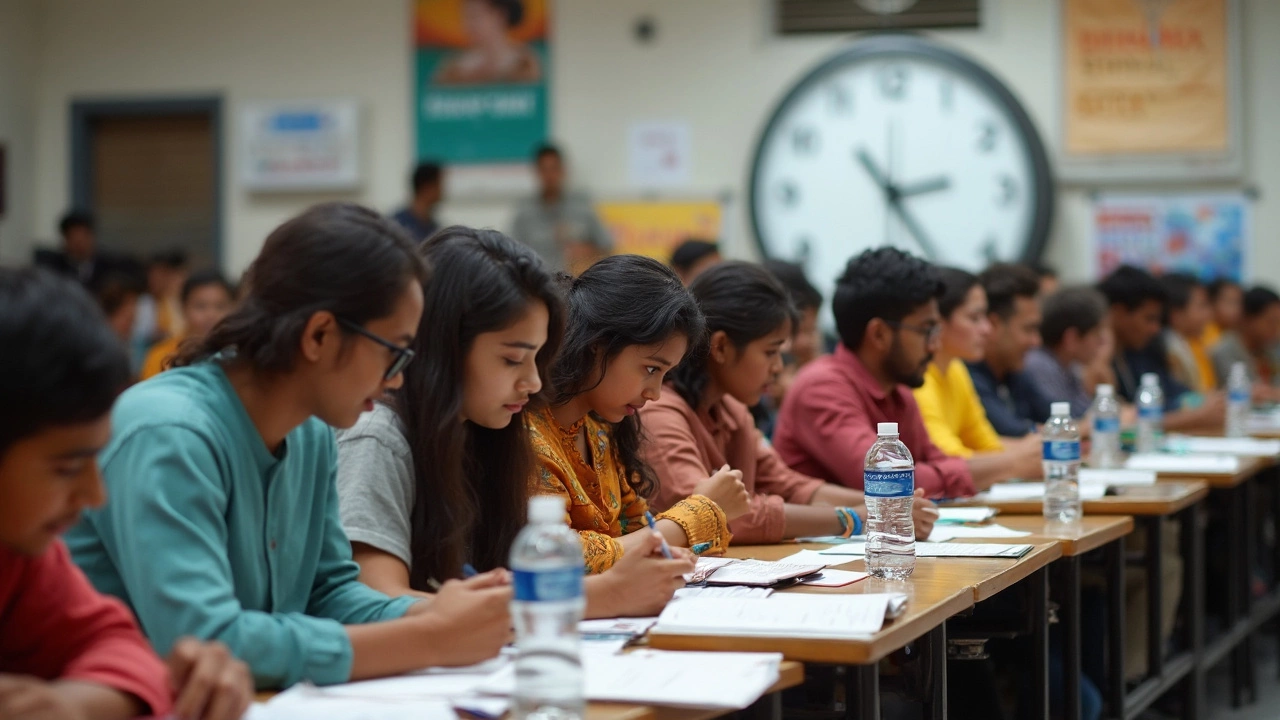Picture this: thousands of sleep-deprived students hunched over desks, barely blinking as they fill in bubble after bubble or scribble frantic essays. This isn’t just a scene from a college drama—it's real life for folks facing America’s toughest exams. But which test really wears the crown for being the most brutal? Here’s a hint: it might not be the one you’re thinking of.
The idea of a 'toughest exam' is more complicated than just the number of people who fail. Sure, some tests are infamous for their crazy low pass rates, but others pile on the pressure in ways you can’t see on a score sheet. We're talking high-stakes, marathon study sessions, and the kind of mental challenges you don’t forget. Understanding what makes these exams so rough is the first step if you’re getting ready to take one—or just curious what all the fuss is about.
- Defining 'Toughest': What Makes an Exam Brutal?
- America's Biggest Academic Hurdles
- Real Stakes: Why Do These Tests Matter?
- Insider Tips for Tackling the Monster Exams
- Myths, Surprises, and Record Stats
- Is It Worth the Pain? Weighing Costs and Rewards
Defining 'Toughest': What Makes an Exam Brutal?
So, what really qualifies as America's toughest exam? It’s not just about a high fail rate or a load of trick questions. There’s a mix of things that turn regular tests into true monsters.
First off, let’s talk pass rates. Something like the California Bar Exam hovers around a 40% pass rate—not exactly a walk in the park. The CFA (Chartered Financial Analyst) Level 1? That usually sees about 36% of folks making it through. It’s harsh. But low pass rates aren’t the whole story.
Then there’s the length of prep time. Exams like the USMLE Step 1 for med students eat up months, sometimes years, of serious study. Some spend over 500 hours just getting ready. That’s time you can’t spend doing much else.
Another piece? The amount of stuff you have to learn. With the bar exam, you’ll face questions covering everything from constitutional law to criminal procedure—and you’re expected to know state and federal details, too. The CFA? Don’t even ask. It’s basically a mini-MBA crammed into three brutal stages.
This table makes it pretty clear why some exams get labeled as the toughest:
| Exam | Usual Pass Rate | Recommended Study Hours |
|---|---|---|
| CFA Level 1 | 36% | 300+ |
| California Bar Exam | 40% | 400-600 |
| USMLE Step 1 | ~94% (MD seniors) | 500+ |
| Patent Bar | 47% | 150-200 |
Let’s not forget test length and question style, too: Some exams run 8 hours (looking at you, USMLE), with marathon sessions that make your brain feel like mush by the end. Others, like the CPA, split into multiple sections spread over days or weeks, just to keep you on your toes.
So, when people talk about the toughest tests, it pays to look at the whole package: crazy amounts of memorization, endless practice, and the mental fight to keep going. It isn’t just about getting the right answers. It’s about surviving the whole grind.
America's Biggest Academic Hurdles
There’s a handful of exams in the U.S. with a reputation so fierce, they make even the smartest people sweat. We're not just talking about the SAT or ACT here—those are the warm-ups. The real monsters are the kind that shape entire careers. When people search for America's toughest exam, a few names keep popping up for good reason.
- United States Medical Licensing Examination (USMLE): If you want to be a doctor, this test rules your life for years. The three-step USMLE series covers everything from biology to patient care. You need to pass every part to even think about practicing medicine. Step 1 alone is infamous for its detail and the stress it brings—famously called a ‘career-maker or breaker’ by medical grads.
- California Bar Exam: Known as the most brutal law exam in the country, the pass rate sometimes dips under 50%. Imagine reading thousands of legal cases, memorizing endless laws, then writing essays nonstop for two days. People spend months, even years, prepping.
- CFA (Chartered Financial Analyst) Exams: This one’s the Everest of finance. Three grueling levels, each with its own curveballs. The average candidate puts in over 300 hours of study per level, and less than one in five pass all three levels in sequence. No calculators with fancy functions allowed—brutal.
- Patent Bar Exam: It’s not just for lawyers—it’s for engineers and scientists who want to work on patents. Heavy on complex technical and legal topics, the questions are picky, and you don't get much time to finish.
- Professional Engineer (PE) Exam: For engineers, this is the final boss. It takes everything you learned in school—and a whole lot you didn’t—and throws it at you in an eight-hour marathon.
Here’s a quick snapshot showing just how tough some of these competitive exams are:
| Exam | Typical Pass Rate | Known For |
|---|---|---|
| USMLE Step 1 | ~93% (first-time US grads); drops for others | Sheer detail, career impact |
| California Bar | ~40-50% | Volume, legal knowledge, writing under pressure |
| CFA Level I | ~40% | Complex finance concepts |
| Patent Bar | ~50% | Technical and legal depth |
| PE Exam | ~70% (for first-timers) | Breadth of topics, real-world focus |
So, while America's toughest exam might mean something different depending on your career, one thing’s for sure—any of these could leave you rethinking your life choices at least once during the process.
Real Stakes: Why Do These Tests Matter?
Here's the deal: these America's toughest exams aren’t just about bragging rights or school pride. They’re literal gatekeepers. If you want to be a doctor, lawyer, or big-shot financier, the only way in is through grueling, nerve-wracking tests. If you fail, doors slam in your face—sometimes for years.
Take the USMLE (United States Medical Licensing Examination), for example. Without a passing score, becoming a practicing doctor in the U.S. is basically impossible. Same energy with the bar exam—no pass, no law license, no courtroom drama. For finance types, the CFA (Chartered Financial Analyst) exams are infamous. Only about 40–45% pass Level 1 on the first shot. That’s not just rough; it means your career hits a roadblock before it even gets moving.
| Exam | 2024 Pass Rate (%) | Typical Career Barrier |
|---|---|---|
| USMLE Step 1 | ~91 (first-time U.S. grads) | Doctor (MD/DO) License |
| Bar Exam | 66 (national average) | Attorney License |
| CFA Level 1 | 44 | Financial Analyst Roles |
The kicker? Most folks pour years (and huge chunks of cash) into studying, prep courses, and retakes. Some, like the USMLE, have limits on how many times you can try. Add in the stress—many test-takers end up with anxiety or burnout—and it’s obvious: these exams shape entire lives, not just résumés.
So yeah, these hardest tests really matter. They decide if people get their dream jobs or have to find a Plan B. It’s not just a bubble sheet. It’s a fork in the road for your whole future.

Insider Tips for Tackling the Monster Exams
There’s no magic bullet for crushing America's toughest exams, but people who’ve survived juggernauts like the CFA and USMLE learn a few tricks that can tip the scale. First thing? Smart planning. Waiting until the last minute is basically asking for trouble. Tests like the USMLE Step 1 or the CFA Level I cover way more material than any college final, so give yourself months, not weeks.
Breaking the content into bite-sized pieces works best. Make a real schedule and actually write it out. Some folks use color-coded calendars, while others swear by apps like Anki or Quizlet to keep track. If you’re into data, you’ll like this: The National Board of Medical Examiners found that students who stuck to regular review sessions scored, on average, 12 points higher than those who crammed at the end.
Another tip—practice with old exams and official sample questions. The bar exam and CFA both release practice sets every year. Working through these helps you spot patterns and get used to the exact kind of questions you’ll face. And don’t forget about time management. Practice with a timer running; burn through those 1-minute per multiple-choice rules to get your brain up to speed.
Stamina matters, too. A lot of these monster exams are marathons, sometimes 6 or 8 hours long. Try simulating test day by sitting for full-length practice runs. Drink the same coffee. Eat the same snacks. It’s about training your body and mind, not just cramming info.
- Study smarter, not just harder. Use active recall instead of passive rereading.
- Teach what you’re learning to someone else—your brain will catch gaps instantly.
- Cut down distractions; put the phone on do not disturb, shut down social media, and focus in chunks of 45-60 minutes.
- Self-care isn’t a joke. Sleeping less will tank your score—multiple studies point to a direct link between rest and test performance.
And about test anxiety—a little bit is normal. If you feel it building, use short breathing exercises or quick walks to keep your nerves in check. Nobody is chill for the bar exam, trust me. Even Fletcher knows Mom gets a little wild-eyed during crunch week.
| Exam | Recommended Prep Time | Typical Test Duration |
|---|---|---|
| USMLE Step 1 | 6-12 months | 8 hours |
| Bar Exam | 2-4 months | 2 days (approx. 12 hours) |
| CFA Level I | 4-6 months | 6 hours |
Don’t let these monster exams psych you out. Plenty of people, even ones with a life and kids, make it through—just takes grit, good habits, and some proper coffee.
Myths, Surprises, and Record Stats
There’s a lot of chatter about America's toughest exam—but some of it’s way off base. First myth: most people think the bar exam or the SAT is the hardest test out there. Nope. The USMLE (United States Medical Licensing Examination) and the CFA (Chartered Financial Analyst) exams are actually tougher if you compare pass rates and prep time.
Let’s break it down with the numbers. According to the CFA Institute, fewer than 45% of test-takers pass CFA Level I, even though most of them already work in finance. For future doctors, the USMLE Step 1 pass rate hovers around 69% for first-timers outside the U.S.—and that’s after years of medical school.
| Exam | Typical Pass Rate (%) | Average Study Hours |
|---|---|---|
| CFA Level I | 42–45 | ~300 |
| USMLE Step 1 | 92 (U.S.) / 69 (Intl.) | ~500–600 |
| California Bar Exam | 30–40 | ~400–600 |
People love saying you must have a 'photographic memory' to pass these exams. That’s just not true. Consistent practice and having the right resources matter way more. Some folks even believe you can cram your way through these nightmares, but studies show that marathon study plans over months—sometimes a whole year—work much better than last-minute cramming.
There are also surprising facts most people don’t know. For example, the SAT, often called impossible, actually has an average score in America around 1050 out of 1600. Meanwhile, the bar exam—even though it terrifies law grads—lets thousands pass every year on their first try.
Here’s a quote from Dr. Atul Grover, AAMC’s chief academic officer, that always hits home:
“No exam defines your future, but preparation always tips the odds in your favor.”Smashing these monster tests comes down to a mix of strategy, grit, and managing the pressure—not magic memory tricks or being a genius.
Is It Worth the Pain? Weighing Costs and Rewards
Let’s get real—prepping for America’s toughest exam can eat up months (sometimes years) of your life. We’re talking about stressful late nights, expensive prep courses, and a social life that pretty much vanishes. For tests like the USMLE, bar exam, or CFA, the grind takes a toll not only on your wallet but on your mental well-being. The CFA, for example, costs over $1,200 just for the Level I exam, not counting study materials or retake fees. And don’t get me started on the lost income if you take time off work.
But here’s why people still sign up for the pain: these exams open doors that really matter. Passing the USMLE means you can finally work as a doctor in the U.S. Clearing the bar means you’re no longer just a law school grad—you’re a legit attorney. And a CFA charter is like a golden ticket in finance; just flash those three letters and suddenly your résumé lands in the right pile. The rewards go beyond bragging rights. On average, doctors, lawyers, and CFAs command much higher salaries compared to peers without those certifications—sometimes double or triple, depending on where you land a job.
| Exam | Average Study Hours | Typical First-Time Pass Rate | Average Salary After Passing |
|---|---|---|---|
| USMLE (Step 1 + 2) | 1,500+ | ~60% | $230,000 (MD resident/fellow) |
| Bar Exam | 400-600 | ~79% | $120,000 (entry lawyer) |
| CFA (Level I-III) | 900-1,300 | ~41% | $135,000+ |
You can see why so many are willing to slug it out. The odds look scary, but the long game usually pays off—with stable jobs, higher income, and sometimes priceless job security. Of course, there are exceptions. If you absolutely hate studying or the career at the end of the tunnel, no salary number is worth the burn out.
So, before you dive in, ask yourself: Do you want what’s on the other side of that test badly enough to justify the sacrifice? If the answer is yes (and you can handle the grind), the payoff can be life-changing. If not, there are plenty of other paths that don’t ask quite so much of your sanity—or your checking account.




